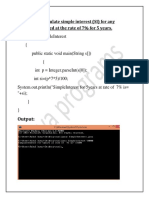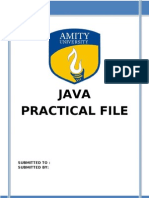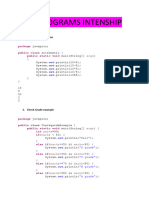Java Programs
Uploaded by
Sunny ChauhanJava Programs
Uploaded by
Sunny Chauhan*Program of Area With Multiple Classes*
class Room { float length,breadth; +void getdata(float a, float b) { length =a; breadth=b; } } class RoomArea { public static void main(String args[]) { float area; Room room1=new Room(); room1.getdata(14,10); area=room1.length*room1.breadth; System.out.println("Area : -\n"+area); } }
Output: Area: -140.0
* Program of Java using Command line Arguments*
class ComLineTest { public static void main (String args[]) { int count, i=0; String string; count=args.length; System.out.println("Number of arguments:- " + count); while(i< count) { string=args[i]; i=i+1; System.out.println (i+ " : " + "Java is" + string+ "!"); } } }
Output: Number of arguments: - 0
* Program of Reading Data from Keyboard*
import java.io.*; class JAVA_005 { public static void main(String[] args) { DataInputStream Input=new DataInputStream(System.in); String N; String Str; try { System.out.println("Enter an Integer value: -\n "); N=Input.readLine( ); System.out.println("Enter a String value: - \n"); Str=Input.readLine( ); int n=Integer.parseInt(N); System.out.println("\nThe Integer value is : " + n); System.out.println("\nThe String value is : " + Str); } catch(IOException e) { System.err.println(e); } } }
Output: Enter an Integer value: 10 Enter a String value: 50 The Integer value is 10 The String value is 50
* Program of Display numbers in the form of Triangle*
class Displaying { public static void main(String args[]) { int i,j; for(i=1;i<=9;i++) { for(j=1;j<=i;j++) { System.out.print(+i); } System.out.print("\n"); } } }
Output: 1 22 333 4444 55555 666666 7777777 88888888 999999999
* Program of Odd_Even using If Statement*
import java.io.*; class Even_Odd { public static void main(String[] args) { DataInputStream Input=new DataInputStream(System.in); String N; try { System.out.println("Enter the Number: - "); N=Input.readLine( ); int n=Integer.parseInt(N); if((n%2)==0) System.out.println("\nThis Number is Even \n"); if((n%2)==1) System.out.println("\nThis Number is ODD \n" ); } catch(IOException e) { System.err.println(e); } } }
Output: Enter the Number: 10 This Number is Even Enter the Number: 3 This Number is Odd
* Program of find Odd_Even using If-Else Statement*
class ifelse { public static void main(String args[]) { int number[]={50,65,56,71,81}; int even=0,odd=0; for(int i=0;i<number.length; i++) { if((number[i]%2)==0) { even+=1; } else { odd+=1; } } System.out.println("Even Numbers: -\n"+even+"\nOdd Numbers: -\n"+odd); } }
Output: Even Numbers: 2 Odd Numbers: 3
Program of Displaying largest Number using Nesting IfElse Statement*
class Nested_ifelse { public static void main(String[] args) { int a=325,b=712,c=478; System.out.println("Largest Value is: -\n"); if(a>b) { if(a>c) { System.out.println(a); } else { System.out.println(c); } } else if(c>b) { System.out.println(c); } else { System.out.println(b); } } }
Output: Largest Value is: 712
* Program to find Divisons using Else-If Ladder Statement*
class elseifladder { public static void main(String args[]) { int roll_number[]={111,222,333,444}; int mar4s[]={81,75,43,58}; for(int i=0;i<roll_number.length;i++) { if(marks[i]>79) System.out.println(roll_number[i]+""+"Honours"); else if(marks[i]>59) System.out.println(roll_number[i]+"Ist Divison"); else if(marks[i]>49) System.out.println(roll_number[i]+"IInd Division"); else System.out.println(roll_number[i]+"Fail"); } } }
Output: 111 Honours 222 Ist Divison 333 Fail 444 IInd Divison
Program using Switch Statement*
class cityguide { public static void main(String args[]) { char choice; System.out.println("Select your choice"); System.out.println("M-> Madras"); System.out.println("B-> Bombay"); System.out.println("C-> Cacutta"); System.out.println("Choice --->"); System.out.flush(); try { switch(choice=(char)System.in.read()) { case 'M': case 'm': System.out.println("Madras: Booklet 5"); break; case 'B': case 'b': System.out.println("Bombay: Booklet 9"); break; case 'C': case 'c': System.out.println("Calcutta: Booklet 15"); break; default: System.out.println("Invalid Choice (IC)"); } } catch(Exception e) { System.err.println("I/O Error"); } } }
Output: M-> Madras B-> Bombay C-> Cacutta Choice ---> M Madras: Booklet 5
* Program to show the sum of first 20 integers using For-statement*
public class JAVA_027 { public static void main(String[] args) { int limit=20; int sum=0; for(int i=1;i<=limit;i++) sum+=i; System.out.println("Sum of first 20 integers: -\n " + sum); } }
Output: Sum of first 20 integers: 210
*Program to show the entered text using While Statement*
class whiletest { public static void main(String args[]) { StringBuffer string = new StringBuffer(); char c; System.out.println("Enter a String: -\n"); try { while((c=(char)System.in.read())!='\n') { string.append(c); } } catch (Exception e) { System.out.println("Error in Input"); } System.out.println("You have entered......\n\n"); System.out.println(string); } }
Output: Enter a String: MANPREET KAUR You have entered.. MANPREET KAUR
*A Program to show the sum of 20 integers using DoWhile Statement*
public class dowhile { public static void main(String[] args) { int limit=20; int sum=0; int i=1; do { sum+=i; i++; } while(i<=limit); System.out.println("Sum of first 20 integers : -\n " + sum); } }
Output: Sum of first 20 integers: 210
*A Program to show the Factorial using Nested loops*
public class JAVA_030 { public static void main(String[] args) { long limit=5; long factorial=1; for(int i=1;i<=limit;i++) { factorial=1; for(int j=2;j<=i;j++) factorial*=j; System.out.println("Factorial of " + i + " = " + i + "! = " + factorial); } } }
Output: Factorial of 1 = 1! = 1 Factorial of 2 = 2! = 2 Factorial of 3 = 3! = 6 Factorial of 4 = 4! = 24 Factorial of 5 = 5! = 120
*A
Program of Rectangle using classes & objects*
class Rectangle { int length,width; void getdata(int x,int y) { length=x; width=y; } int rectarea() { int area=length*width; return(area); } } class rectarea1 { public static void main(String args[]) { int area1,area2; Rectangle rect1=new Rectangle(); Rectangle rect2=new Rectangle(); rect1.length=15; rect1.width=10; area1=rect1.length*rect1.width; rect2.getdata(20,12); area2=rect2.rectarea(); System.out.println("Area1: -\n"+area1); System.out.println("Area2: -\n"+area2); } }
Output: Area1: 150 Area2: 240
*A Program of using Constructors in Java*
class Rectangle { int length,width; Rectangle(int x,int y) { length=x; width=y; } int rectarea() { return(length*width); } } class Rectanglearea { public static void main(String args[]) { Rectangle rect1=new Rectangle(15,10); int area1=rect1.rectarea(); System.out.println("Area1: -\n"+area1); } }
Output: Area1: 150
*A Program of Method Overloading in Java*
class Room { int length,breadth; Room(int x,int y) { length=x; breadth=y; } Room(int x) { length=breadth=x; } int area() { return(length*breadth); } } class Roomarea { public static void main(String args[]) { Room room1=new Room(25,15); Room room2=new Room(20); int area1=room1.area(); int area2=room2.area(); System.out.println("Without Overloaded value is\n"+area1); System.out.println("With Overloaded value is\n"+area2); } }
Output: Without Overloaded value is 375 With Overloaded Value is 400
* A Program of defining & using Static Members*
class Mathoperation { static int mul(int x,int y) { return (x*y); } static int divide(int x,int y) { return x/y; } } class mathapplication { public static void main(String args[]) { int a=Mathoperation.mul(4,5); int b=Mathoperation.divide(a,2); System.out.println("B: -\n"+b); } }
Output: B: 10
*A Program of Single Inheritance*
class Room { int length; int breadth; Room(int x,int y) { length=x; breadth=y; } int area() { return(length*breadth); } } class bedroom extends Room { int height; bedroom(int x,int y,int z) { super(x,y); height=z; } int volume() { return (length*breadth*height); } } class inhertest { public static void main(String args[]) { bedroom room1=new bedroom(14,12,10); int area1=room1.area(); int volume1=room1.volume(); System.out.println("Area1: -\n"+area1); System.out.println("Volume: -\n"+volume1); } }
Output: Area1: 168 Volume: 1680
*A Program of Method Overriding*
class Super { int x; Super(int x) { this.x=x; } void display() { System.out.println("Super x="+x); } } class Sub extends Super { int y; Sub (int x,int y) { super(x); this.y=y; } void display() { System.out.println("Super x: -\n"+x); System.out.println("Sub y: -\n"+y); } } class OverRideTest { public static void main(String args[]) { Sub s1=new Sub(100,200); s1.display(); } }
Output: Super x: 100 Sub y: 200
*A Program of Sorting a list of numbers*
class sorting { public static void main(String args[]) { int no[]={55,40,80,65,71}; int n=no.length; for(int i=0;i<n;i++) { System.out.println(""+no[i]); } for(int i=0;i<n;i++) { for(int j=i+1;j<n;j++) { if(no[i]<no[j]) { int temp=no[i]; no[i]=no[j]; no[j]=temp; } } } System.out.println("Sorted List\n"); for(int i=0;i<n;i++) { System.out.println(""+no[i]); } System.out.println(""); }
Output: 55 40 80 65 71 Sorted List 80 71 65 55 40
*A Program of Sorting a list of numbers*
public class two_d { public static void main(String[] args) { int[][] array={ {10,-1,28,13,44} , {5,36,97,-18,11} }; System.out.println("The contents of the 2D Array are : \n"); for(int i=0;i<array.length;i++) { System.out.println("Dimension # " + (i+1)); for(int j=0;j<array[i].length;j++) System.out.println("\t Array[" + i + "][" + j + "] = " + array[i][j]); } } }
Output: Dimension # 1 Array[0][0]=10 Array[0][1]=-1 Array[0][1]=28 Array[0][1]=13 Array[0][1]=44 Dimension # 2 Array[1][0]=5 Array[1][1]=36 Array[1][2]=97 Array[1][3]=-18 Array[1][4]=11
*A Program of Alphabetically ordering of Strings*
class Stringordering { static String name[]={"Madras","Delhi","Ahmedabad","Calcutta","Bombay"}; public static void main(String args[]) { int size=name.length; String temp=null; for(int i=0;i<size;i++) { for(int j=i+1;j<size;j++) { if(name[j].compareTo(name[i])<0) { temp=name[i]; name[i]=name[j]; name[j]=temp; } } } for(int i=0;i<size;i++) { System.out.println(name[i]); } } }
Output: Ahmedabad Bombay Calcutta Delhi Madras
*A Program of implementing Interfaces*
Interface Area { final static float pi=3.14F; float compute(float x,float y); } Class Rectangle implements Area { public float compute(float x,float y) { return (x*y); } } class Circle implements Area { public float compute(float x,float y) { return(pi*x*x); } } class InterfaceTest { public static void main(String args[]) { Rectangle rect=new Rectangle(); Circle cir=new Circle(); Area area; area=rect; System.out.println("Area of Rectangle: -\n"+area.compute(10,20)); area = cir; System.out.println("Area of Circle: \n"+area.compute(10,0)); } }
Output: Area of Rectangle: 200.0 Area of Circle: 314.0
*A Program of Implementing Multiple Inheritance*
class student { int rollnumber; void getnumber(int n) { rollnumber=n; } void putnumber() { System.out.println("Roll No"+rollnumber); } } class test extends student { float part1,part2; void getmarks(float m1, float m2) { part1=m1; part2=m2; } void putmarks() { System.out.println("Marks Obtained: -\n"); System.out.println("part 1: -\n"+part1); System.out.println("part 2: -\n"+part2); } } interface sports { float sportwt=6.0F; void putwt(); } class Results extends test implements sports { float total; public void putwt() { System.out.println("Sports WT: -\n"+sportwt); } void display() { total =part1+part2+sportwt; putnumber();
putmarks(); putwt(); System.out.println("Total Score: -\n"+total); } } class hybrid { public static void main(String args[]) { Results student1=new Results(); student1.getnumber(1234); student1.getmarks(27.5F,33.0F); student1.display(); } }
Output: part 1: 27.5 part 2: 33.0 Sports WT: 6.0 Total score: 66.5
*A Program of Abstract class*
abstract class A { abstract void callme(); void callmetoo() { System.out.println("This is a concrete method\n"); } } class B extends A { void callme() { System.out.println("B is implementation of callme"); } } class abstract_demo { public static void main(String args[]) { B b=new B(); b.callme(); b.callmetoo(); } }
Output: B is implementation of Callme This is a concrete method
*PROGRAM TO FIND THE AREA OF RECTANGLE USING ABSTRACT CLASSES*
abstract class Figure { double dim1,din2; Figure(double a,double b) { dim1=a; dim2=b; } abstract double area(); { class RectangleArea() extends Figure { Rectangle (double a,double b) { super(a,b); } double area() { System.out.println("Inside area for rectangle"); return dim1*dim2; } } } class Triangle extends Figure { Triangle(double a,double b) { super (a,b); } double area() { System.out.println("Inside area for Triangle"); return (dim1*dim2)/2; } } class AbstractArea { public static void main(String args[]) Rectangle r= new Rectangle(9,5); Triangle t= new Triangle(10,8); Figure figref; Figref=r
System.out.println("area is"+figref.area[]); Figref=t; System.out.println("area is"+figref.area()); } }
OUTPUT:-
*A Program of Casting Operation*
class casting { public static void main(String args[]) { float sum; int i; sum=0.0F; for(i=1;i<=10;i++) { sum=sum+1/(float)i; System.out.print("I: - "+i+"\n"); System.out.print("Sum: - "+sum+"\n"); } } }
Output: I: - 1 I: - 2 I: - 3 I: - 4 I: - 5 I: - 6 I: - 7 I: - 8 I: - 9 I: - 10 Sum: - 1 Sum: - 1.5 Sum: - 1.83333 Sum: - 2.08333 Sum: - 2.2833 Sum: - 2.45 Sum: - 2.59286 Sum: - 2.71786 Sum: - 2.82897 Sum: - 2.92897
*A Program of Nesting of Methods*
class nesting { int m,n; nesting(int x,int y) { m=x; n=y; } int largest() { if(m>=n) return(m); else return(n); } void display() { int large=largest(); System.out.println("Largest value: -\n"+large); } } class nestingtest { public static void main(String args[]) { nesting nest=new nesting(50,40); nest.display(); } }
Output: Largest value: 50
*A Program of using Increment Operator*
class incrementoperator { public static void main(String args[]) { int m=10,n=20; System.out.println("M: - "+m); System.out.println("n: - "+n); System.out.println("++m: - "+ ++m); System.out.println("n++: - "+n++); System.out.println("m: - "+m); System.out.println("n: - "+n); } }
Output: M: - 10 n: - 20 ++m: - 11 n++: - 20 m: -11 n: - 21
*A Program of creating an Applet*
import java.awt.*; import java.applet.*; public class hellojava extends Applet { String str; public void init() { str=getParameter("String"); if(str==null) str = "Java"; str="Hello"+str; } public void paint (Graphics g) { g.drawString(str,10,100); } }
Output: Appletviewer hellojava.html Applet
HelloJava
Applet started
*A Program of Starting A Thread Using Runnable*
class FooRunnable implements Runnable { public void run() { for(int x =1; x < 6; x++) { System.out.println("Runnable running"); } } } public class TestThreads { public static void main (String [] args) { FooRunnable r = new FooRunnable(); Thread t = new Thread(r); t.start(); } }
Output: % java TestThreads Runnable running Runnable running Runnable running Runnable running Runnable running
*A Program of Implementing Inner Classes*
class MyInner { public void seeOuter() { System.out.println("Outer x is " + x); System.out.println("Inner class ref is " + this); System.out.println("Outer class ref is " + MyOuter.this); } } class MyOuter { private int x = 7; public void makeInner() { MyInner in = new MyInner(); in.seeOuter(); } class MyInner public void seeOuter() { System.out.println("Outer x is " + x); System.out.println("Inner class ref is " + this); System.out.println("Outer class ref is " + MyOuter.this); } } public static void main (String[] args) { MyOuter.MyInner inner = new MyOuter().new MyInner(); inner.seeOuter(); } }
Output: Outer x is 7 Inner class ref is MyOuter$MyInner@113708 Outer class ref is MyOuter@33f1d7
*A Program of Handling Exceptions*
import java.io.*; public class ReadData { public static void main(String args[]) { try { RandomAccessFile raf = new RandomAccessFile("myfile.txt", "r"); byte b[] = new byte[1000]; raf.readFully(b, 0, 1000); } catch(FileNotFoundException e) { System.err.println("File not found"); System.err.println(e.getMessage()); e.printStackTrace(); } catch(IOException e) { System.err.println("IO Error"); System. err. println(e. toString()); e.printStackTrace(); } } }
Output: This will handle different exceptions
*A Program of implementing a package*
package package1; public class classA { public void displayA() { System.out.println(Class A); } } //Now save it to destination with folder name package1 import package1.classA; class PackageTest { public static void main(String args[]) { classA objectA=new classA(); object.displayA(); } }
Output: Class A
*A Program of Creating file through file object*
import java.io.*; class Writer1 { public static void main(String [] args) { try { boolean newFile = false; File file = new File; System.out.println(file.exists()); newFile = file.createNewFile(); System.out.println(newFile); System.out.println(file.exists()); } catch(IOException e) { } } }
Output: false true true And also produces an empty file in your current directory. If you run the code a second time you get the output true false true
You might also like
- Kuvempu University: Laboratory Assignments Subject: JAVA Programming Subject Code: BSIT - 42No ratings yetKuvempu University: Laboratory Assignments Subject: JAVA Programming Subject Code: BSIT - 429 pages
- JAVA PROGRAMMING PRACTICAL FILE 2222akashNo ratings yetJAVA PROGRAMMING PRACTICAL FILE 2222akash24 pages
- Q1 Example Class To Demostrate The Shorthand NotationNo ratings yetQ1 Example Class To Demostrate The Shorthand Notation5 pages
- Configuring File and Folder Access: This Lab Contains The Following Exercises and ActivitiesNo ratings yetConfiguring File and Folder Access: This Lab Contains The Following Exercises and Activities8 pages
- Internet, Cyber Security and Ethics: Chapter 8: The World Wide Web (WWW) by The International OpenNo ratings yetInternet, Cyber Security and Ethics: Chapter 8: The World Wide Web (WWW) by The International Open28 pages
- Digital Communication Frequency Shift KeyingNo ratings yetDigital Communication Frequency Shift Keying3 pages
- Cisco IOS IP Switching Command ReferenceNo ratings yetCisco IOS IP Switching Command Reference472 pages
- Microcontroller Based Smart Home With Security Using GSM TechnologyNo ratings yetMicrocontroller Based Smart Home With Security Using GSM Technology9 pages
- American and British English Spelling DifferencesNo ratings yetAmerican and British English Spelling Differences5 pages
- 4H.2209 - Illustrated Spare Parts Manual - KFP4R-UF07 - FM-UL PDF100% (1)4H.2209 - Illustrated Spare Parts Manual - KFP4R-UF07 - FM-UL PDF91 pages
- CCpilot XA and CCpilot XS - Software GuideNo ratings yetCCpilot XA and CCpilot XS - Software Guide35 pages

























































































